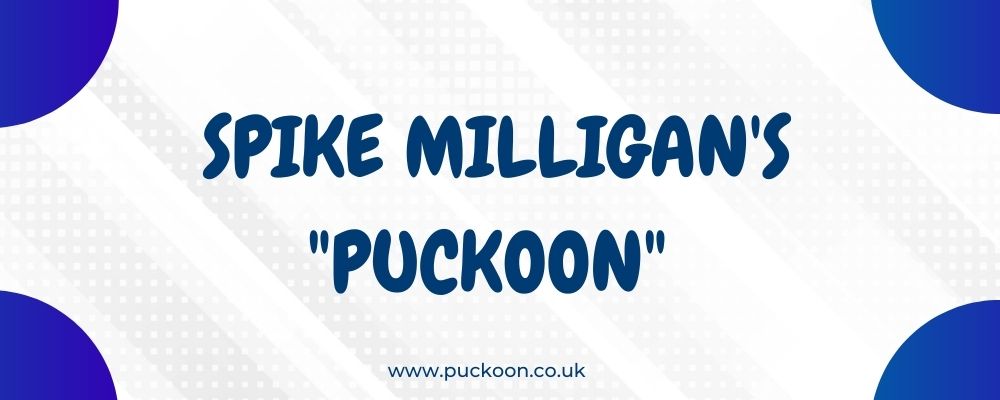Introduction
Spike Milligan’s “Puckoon” is a novel that stands out not only for its comedic genius but also for its biting satire and poignant reflections on human nature. Published in 1963, “Puckoon” is a unique blend of absurdity and sharp social commentary, encapsulating the essence of Milligan’s multifaceted career as a comedian, writer, and actor. This article delves into the various aspects of “Puckoon,” examining its plot, characters, themes, style, and legacy.
Spike Milligan: The Man Behind the Novel
Before diving into the novel itself, it is essential to understand its creator, Spike Milligan. Born in India in 1918 and later moving to England, Milligan’s experiences during World War II and his subsequent career in comedy, most notably with “The Goon Show,” profoundly influenced his writing style. His humor often intertwined with darker themes, reflecting his personal struggles with mental health. Milligan’s unique perspective on life, shaped by both his comedic brilliance and his battles with depression, is evident throughout “Puckoon.”
The Plot of “Puckoon”
“Puckoon” is set in 1924 in a small, fictional Irish village of the same name, which finds itself absurdly divided by the newly established border between Northern Ireland and the Irish Free State. The border runs through the village, causing chaos and confusion among its inhabitants.
The Boundary Line
The central absurdity of “Puckoon” revolves around the arbitrary boundary line that splits the village. This division results in comical scenarios, such as the local pub’s bar being in one country while its toilets are in another. The border disrupts daily life, making simple activities ludicrously complicated and highlighting the absurdity of political borders.
The Characters
The novel boasts a colorful cast of characters, each adding to the comedic tapestry of the story:
- Dan Milligan: The protagonist, a lazy and hapless villager who inadvertently becomes embroiled in the chaos of the border situation. Dan’s misadventures and interactions with other villagers provide much of the novel’s humor.
- Father Rudden: The local priest who struggles to maintain order and sanity in the divided village. His efforts to navigate the border’s complications are both comical and touching.
- Sir Dermot: A landowner whose property is split by the border, leading to humorous and absurd legal and logistical challenges.
- Mrs. O’Toole: A resourceful and resilient villager who, despite the absurdities around her, tries to keep her life as normal as possible.
Key Events
Throughout the novel, various key events and situations underscore the absurdity of the border. These include the relocation of the village cemetery, the division of the pub, and the bureaucratic nightmares faced by the villagers. Each event is a comedic exploration of the real-life implications of arbitrary political decisions.
Themes and Satire
While “Puckoon” is undeniably a comedy, it also serves as a vehicle for Milligan’s sharp social commentary. Several themes and satirical elements run through the novel, offering deeper insights into the author’s views on society, politics, and human nature.
The Absurdity of Borders
One of the most prominent themes in “Puckoon” is the absurdity of borders. Milligan uses the division of the village to satirize the notion of arbitrary political boundaries. The novel humorously explores how these borders can disrupt daily life and create unnecessary complications, reflecting Milligan’s critique of the political landscape of his time.
The Bureaucracy and Ineptitude
Milligan also takes aim at bureaucracy and governmental ineptitude. The novel is filled with instances of bureaucratic red tape and official incompetence, highlighting the often farcical nature of governmental processes. This theme resonates with readers, as it underscores the disconnect between those in power and the people affected by their decisions.
Human Resilience and Adaptability
Despite the chaos and absurdity, “Puckoon” also showcases the resilience and adaptability of the human spirit. The villagers, faced with an absurd situation, find ways to cope and adapt. This theme is a testament to Milligan’s belief in the strength and ingenuity of ordinary people, even in the face of ridiculous circumstances.
Narrative Style and Humor
Spike Milligan’s narrative style in “Puckoon” is distinctive and integral to the novel’s comedic impact. His use of humor, both absurd and satirical, creates a unique reading experience.
Breaking the Fourth Wall
Milligan frequently breaks the fourth wall in “Puckoon,” directly addressing the reader and commenting on the story as it unfolds. This technique not only enhances the comedic effect but also creates a sense of intimacy between the author and the reader. It allows Milligan to share his thoughts and jokes more directly, making the humor feel personal and immediate.
Wordplay and Puns
The novel is rich with wordplay and puns, showcasing Milligan’s linguistic creativity. His playful use of language adds layers of humor and keeps the reader engaged. This style is reminiscent of his work in “The Goon Show,” where verbal wit and clever wordplay were central to the comedy.
Visual and Physical Comedy
Milligan’s background in visual comedy is evident in the physical humor and slapstick elements of “Puckoon.” The novel’s descriptions of absurd situations and the characters’ physical antics are vividly portrayed, creating a visual comedy that leaps off the page. This blend of verbal and physical humor is a hallmark of Milligan’s style.
Cultural and Historical Context
Understanding the cultural and historical context of “Puckoon” enhances the appreciation of its themes and humor. The novel was written during a time of significant political and social change, both in Ireland and globally.
The Irish Border and Partition
The division of Ireland and the establishment of the border in the 1920s were contentious and impactful events. Milligan uses the historical context of the Irish partition to highlight the absurdity and human cost of such political decisions. The novel’s setting in 1924, shortly after the partition, reflects the immediate and chaotic impact of this historical event on everyday life.
Post-War Britain and Satire
Written in the early 1960s, “Puckoon” also reflects the post-war British context. The novel’s satire of bureaucracy and political incompetence can be seen as a critique of the British establishment and its handling of post-war challenges. Milligan’s humor, while universal, is rooted in his experiences and observations of British society during this period.
Critical Reception and Legacy
“Puckoon” received mixed reviews upon its release, with some critics praising its humor and originality, while others found it too chaotic and disjointed. However, over time, the novel has gained a cult following and is regarded as a classic of comic literature.
Initial Reception
When “Puckoon” was first published, it was met with a range of reactions. Some critics appreciated Milligan’s unique comedic voice and the novel’s absurdist humor. Others, however, were less impressed, finding the plot incoherent and the humor too erratic. Despite the mixed reviews, “Puckoon” attracted a dedicated readership who admired Milligan’s distinctive style.
Cult Status and Influence
Over the years, “Puckoon” has achieved cult status, beloved by fans of Spike Milligan and comic literature. Its influence can be seen in the works of subsequent writers and comedians who have drawn inspiration from Milligan’s blend of absurdity and satire. The novel’s enduring appeal lies in its timeless humor and its incisive commentary on human nature and society.
Adaptations and Media
“Puckoon” has been adapted into various media, including a stage play and a radio dramatization. These adaptations have introduced the novel to new audiences and highlighted its versatility as a comedic work. The stage and radio versions capture the spirit of Milligan’s humor, bringing the absurdity of Puckoon to life in new ways.
Conclusion
Spike Milligan’s “Puckoon” is a novel that defies conventional categorization. It is a comedy, a satire, and a social commentary, all wrapped into one. Through its absurd plot, memorable characters, and biting humor, “Puckoon” offers a unique and insightful look at the human condition and the absurdities of the world we live in. Despite its initial mixed reception, the novel has earned its place as a classic of comic literature, continuing to entertain and provoke thought in readers around the world.

















Trackbacks/Pingbacks